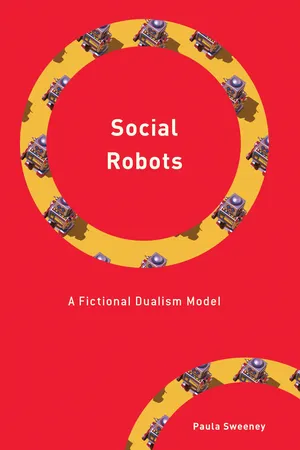
- 153 pages
- English
- PDF
- Available on iOS & Android
eBook - PDF
About this book
Social robots are an increasingly integral part of society, already appearing as customer service assistants, care-home helpers, teaching assistants and personal companions. This book argues that the wider inclusion of social robots in our society is having a revolutionary impact on some of our key intuitions regarding ethics, metaphysics and epistemology and, as such, will put pressure on many of our best theories.
Social robots elicit an emotional and social response in humans that some have taken to be evidence that robots deserve moral consideration. Others have argued that, as robots are only machines, we should avoid designing robots that encourage emotional engagement. The fictional dualism model provides a new way for us to view social robots and a new route for our continued relationship with them. When we engage with a social robot, we create a fictional overlay that has wants, needs and desires. Our emotional attachment to social robots is a natural continuation of our relationship to fiction: a life-enhancing and important connection, but not one that prompts moral consideration for the fictional entity.
In this book, Paula Sweeney shows how the fictional dualism model of social robots differs from other popular models. In addition to providing a distinctive and ethically appropriate framework for emotional engagement without moral consideration, the model provides conditions for trusting social robots and, uniquely, allows us to individuate social robots as distinct persons, even in contexts in which they share a collective mind.
Social robots elicit an emotional and social response in humans that some have taken to be evidence that robots deserve moral consideration. Others have argued that, as robots are only machines, we should avoid designing robots that encourage emotional engagement. The fictional dualism model provides a new way for us to view social robots and a new route for our continued relationship with them. When we engage with a social robot, we create a fictional overlay that has wants, needs and desires. Our emotional attachment to social robots is a natural continuation of our relationship to fiction: a life-enhancing and important connection, but not one that prompts moral consideration for the fictional entity.
In this book, Paula Sweeney shows how the fictional dualism model of social robots differs from other popular models. In addition to providing a distinctive and ethically appropriate framework for emotional engagement without moral consideration, the model provides conditions for trusting social robots and, uniquely, allows us to individuate social robots as distinct persons, even in contexts in which they share a collective mind.
Frequently asked questions
Yes, you can cancel anytime from the Subscription tab in your account settings on the Perlego website. Your subscription will stay active until the end of your current billing period. Learn how to cancel your subscription.
No, books cannot be downloaded as external files, such as PDFs, for use outside of Perlego. However, you can download books within the Perlego app for offline reading on mobile or tablet. Learn more here.
Perlego offers two plans: Essential and Complete
- Essential is ideal for learners and professionals who enjoy exploring a wide range of subjects. Access the Essential Library with 800,000+ trusted titles and best-sellers across business, personal growth, and the humanities. Includes unlimited reading time and Standard Read Aloud voice.
- Complete: Perfect for advanced learners and researchers needing full, unrestricted access. Unlock 1.4M+ books across hundreds of subjects, including academic and specialized titles. The Complete Plan also includes advanced features like Premium Read Aloud and Research Assistant.
We are an online textbook subscription service, where you can get access to an entire online library for less than the price of a single book per month. With over 1 million books across 1000+ topics, we’ve got you covered! Learn more here.
Look out for the read-aloud symbol on your next book to see if you can listen to it. The read-aloud tool reads text aloud for you, highlighting the text as it is being read. You can pause it, speed it up and slow it down. Learn more here.
Yes! You can use the Perlego app on both iOS or Android devices to read anytime, anywhere — even offline. Perfect for commutes or when you’re on the go.
Please note we cannot support devices running on iOS 13 and Android 7 or earlier. Learn more about using the app.
Please note we cannot support devices running on iOS 13 and Android 7 or earlier. Learn more about using the app.
Yes, you can access Social Robots by Paula Sweeney in PDF and/or ePUB format, as well as other popular books in Philosophy & Epistemology in Philosophy. We have over one million books available in our catalogue for you to explore.
Information
Table of contents
- Cover
- Half Title
- Series Page
- Title Page
- Copyright Page
- Dedication
- Acknowledgements
- Introduction
- Chapter 1: What Can Philosophy Teach Us about Robots?
- Chapter 2: Humans and Robots
- Chapter 3: Social Robots and Moral Consideration
- Chapter 4: The Fictional Dualism Model of Social Robots
- Chapter 5: Robots and Identity
- Chapter 6: Trusting Social Robots
- Chapter 7: Indirect Harms and Robot Rights
- Conclusion
- Notes
- Bibliography
- Index
- About the Author